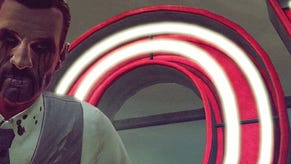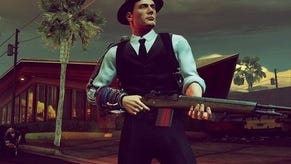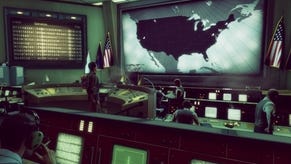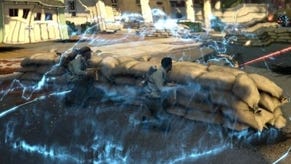The Bureau: XCOM Declassified review
I want to believe.
"Strategy games are just not contemporary." So said 2K Games boss Christoph Hartmann back in 2011, when discussing the push to reboot the beloved X-COM series.
The Bureau: XCOM Declassified is born of this lack of confidence in the past. It has all the things modern gamers are supposed to want. A growling hero with a dark past! Moral choices! Conversation wheels! Cover-based shooting! Let the geeks have their turn-based strategy, it seems to say, and we'll get busy with the sticky grenades over here in the big boy pool.
Except, despite being "just not contemporary", last year's turn-based XCOM game, Enemy Unknown, was both brilliant and popular - which leaves this spin-off feeling surplus to requirements. Reconfigured late in development from a first-person shooter to a more tactical third-person squad game, The Bureau is an almost effective hybrid of modern blockbuster tropes and more interesting ideas hastily reintroduced from its supposedly outdated predecessor.
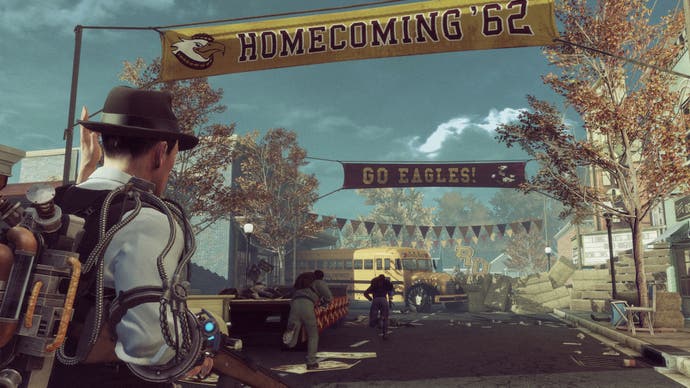
It's a prequel, of sorts, though long serving X-COM fans will have to turn their brains inside out to reconcile the events portrayed here with the series they know. Set in the early 1960s, just after the first wave of flying saucer mania subsides, you play Will Carter, a reckless, alcoholic FBI agent haunted by the death of his family. None of this factors into the story, other than to give him the prickly, loose-cannon affectations that such characters are obliged to have. He's a gruff bore.
Recruited into the nascent XCOM organisation following a curious encounter with a glowing briefcase, Carter finds himself at the sharp end of a war against an aggressive alien invader, a coalition of different species known as Mosaic. From rural farms to small towns, it's up to you - and your fellow agents - to repel the space invaders.
In terms of setup, much is carried over from the more traditional strategy game. You recruit agents, select missions from a map and engage in skirmishes with the enemy. Agents can be customised with new names, and should they die in the field, they're gone forever. In the field, familiar shield icons show you how much cover an object provides, while you order your two fellow squad members around using an intuitive skill wheel that provides some of the tactical oversight of turn-based gaming without all that waiting around.
And it works, eventually. If The Bureau has one major failing, it's that it gets off to a sluggish and clumsy start. Enemies hit hard, even on the lower difficulties, and your team members are distressingly stupid. You can direct them to a certain position but, unlike in an actual strategy game, they won't necessarily stay there. In theory, this is a good thing as it means they can move out of trouble. In reality, it means that your first few encounters are punctuated by constant cries for healing - which you can automatically deploy across the squad from your skill menu - and for rescue.
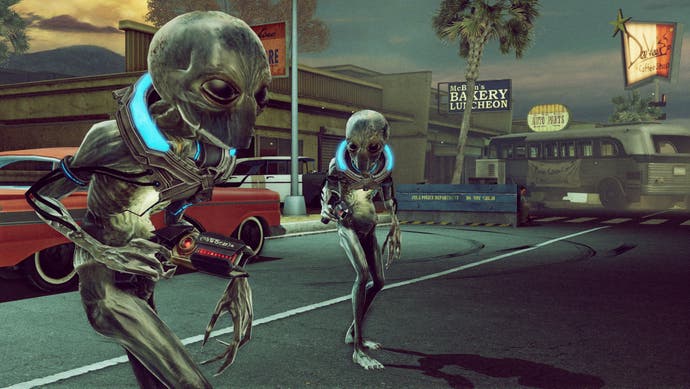
Far too often, you'll be required to squat-dash to some fallen agent who has inexplicably darted out of cover. With bleed-out timers that tick away far too quickly and movement that feels a little too stiff and slow for such urgent interventions, those early missions can be a real chore.
Once you reach the level cap combat is genuinely fun, filled with possibilities and with just enough tactical edge
Once you learn that your companions can't really be trusted and spend more time dictating and queuing their actions from your command wheel, things start to level out. And, as both Carter and your agents level up, you gain abilities that tip the scales in your favour. Air strikes, proximity and rocket turrets are predictable inclusions, but they get the job done.
The more fun skills are saved for the player: summoning a ball of alien goo that seeks out enemies like an attack dog, mind-controlling even the biggest enemies and turning them against their allies, or calling on a hovering drone which heals the good guys while blasting the baddies. Once you reach the level cap - 10 for the player, five for recruits - combat is genuinely fun, filled with possibilities and with just enough tactical edge to keep it from mindless mayhem.
Getting to that point is more of a trudge than it should be, however, and not just because of the gluey movement and dimwit AI. The whole game feels stodgy, padded as it is by long, ponderous segments between missions in which you're expected to schlep around XCOM's maze-like headquarters, triggering overlong dialogue in which you select responses not for any dramatic reason but just so that these lumpy exposition dumps feel moderately interactive.
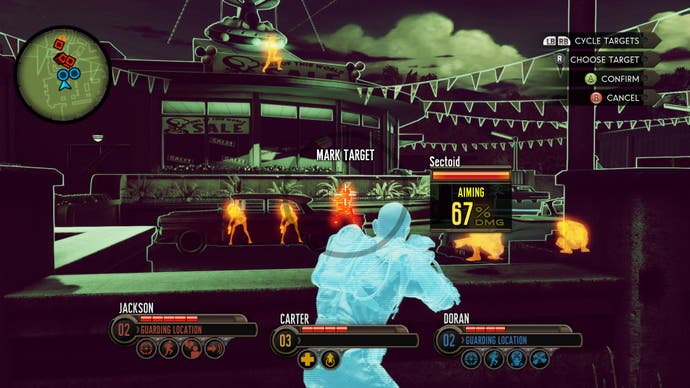
Similarly flat are the attempts at environmental storytelling, with lots of insipid notes, photos and letters scattered throughout the game, glowing yellow. Rather than adding colour or detail to the narrative, these meaningless trinkets just end up feeling trite. How many tear-stained last words to loved ones do we need to find? The game does a decent job of selling the tragedy of the invasion through visuals alone - with detail-rich locations and a fine, granular quality to its eerily abandoned diners and town squares populated by shuffling alien-infected civilians. Layering yet more story on top feels like gilding the lily.
Too much of The Bureau feels like it was included because that's what other games have done. With combat pulled from Gears of War, alien locations that could have come from Halo, squad control leaning heavily on Mass Effect and world-building inspired by BioShock (which developer 2K Marin previously worked on), this is already a game in danger of losing its identity. That it proceeds to undersell the very elements that might make it unique - the ideas that could make it a true X-COM title - is therefore a real shame.
The most potent example of this comes in the form of Dispatch Missions. These sit alongside the major and minor operations of the main campaign, and exist so that your dormant agents have something to do while you're propelling the story forwards. Each Dispatch Mission has a complexity rating, and as long as you assign agents whose skill levels match or exceed that number, they'll be victorious. That's as deep as the strategy goes. If a mission is rated eight, just assign two Level 4 agents. It doesn't matter what class they are or what the mission entails. If you can do basic addition, you'll breeze through this potentially rich section of the game in less than a few minutes and be rewarded with some gadget when you return from the field.
The game's grasp on its identity gets even looser as the story staggers along, driven by a confusing tangle of last-minute reversals, betrayals and plot twists that muddy the water too much. That the final sections take place in generic alien locations that look like every other sci-fi action game from the last 10 years - all grey-blue angular metal and inexplicable lights stuck to everything - only saps the momentum further.
With so much accumulated fat gumming up The Bureau's arteries, it's easy to miss that there's actually a healthy gameplay heart pumping away in here
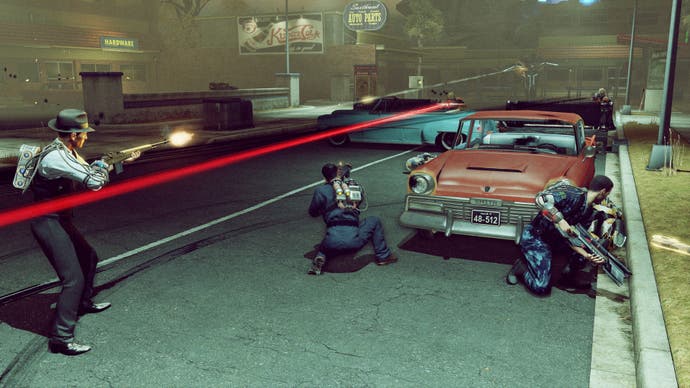
With so much accumulated fat gumming up The Bureau's arteries, it's easy to miss that there's actually a healthy gameplay heart pumping away in here. Certainly, when you're hunkered down on the roof of some remote hunting lodge, assailed on all sides by alien foes and frantically juggling the cooldown timers of your life-saving abilities, The Bureau can be a really enjoyable tactical shooter. In those moments, it springs to life. It's just a pity that it lacks the confidence to sustain that energy, to remake the modern action game in X-COM's unique image, rather than submerging the brand in borrowed blockbuster clothing.
Given its fractured development and lumpen structure, the fact that The Bureau is actually pretty good is arguably victory enough. It's certainly the "contemporary" game 2K wanted - but it's never as inventive or memorable as the strategy game that inspired it.



